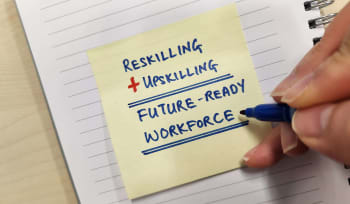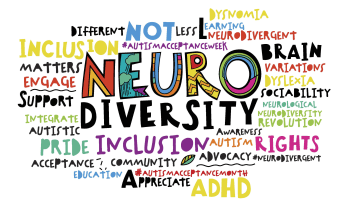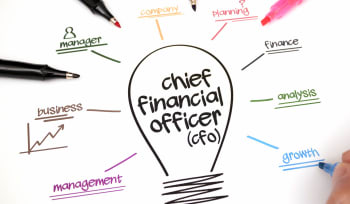This informal CPD article “Mental Health at Work: Putting Wellbeing at the Heart of 2020” was provided by Darren Hockley, MD of DeltaNet International. DeltaNet is an eLearning provider offering a wide range of health and safety and compliance training courses for businesses.
Mental Health at Work
At the backend of 2019, the HSE published its health and safety at work report 2018/19. This insightful document collates data about work-related ill health and injuries for the year, but – crucially – also reveals the economic impact of these conditions; including how many companies faced prosecution for neglecting their duty of care to staff. Positively speaking, the report does indicate a downward trend for work-related ailments throughout 2018/19 – although only slightly, as numbers have remained broadly flat across the last 5 years.
Whilst this might seem cause for cautious optimism amongst health and safety professionals, it’s interesting to see how these numbers break down. For instance, by far the most working days lost last year (54%) were due to job-related, stress, depression, or anxiety. That’s almost 13 million days lost in total due to work-related mental health issues, and this number appears to be rising, with 246,000 new cases reported over the last year alone.
Workplace culture
Workload, lack of support, violence, threats, bullying and changes at work are estimated to be the main causes of stress, depression, or anxiety for workers according to the report. Worryingly, these are all issues which describe a pervasive and underlying attitude about workplace wellbeing that hasn’t yet been fully addressed as we move into a new decade.
Education and awareness
As an eLearning specialist, I’m an advocate of training to help raise the profile of mental health at work. Awareness training helps leaders to recognise the warning signs of deteriorating mental health and, if necessary, address the issue in a sensitive and empathetic manner. It discourages negative tendencies, like sweeping mental health issues under the rug, by demystifying the topic and increasing understanding. Training can also empower employees to speak-up about emotional distress and recognise acceptable versus unacceptable treatment at work. Knowing your workers’ rights (and where to go if these rights aren’t upheld) can legitimise feelings of depression, stress, or anxiety at work, helping to raise both awareness and esteem on the matter.
Raising the bar
Still, training is but one piece of the puzzle when it comes to long term change – and mental health initiatives can take many forms depending on your business, employees, or industry. The key, I think, is to remain agile and always open to improvement. As Laura Batchelor, Client Services Director at KC Communications suggests, “We consistently promote a culture of openness and honesty about health and wellbeing. All staff are made aware that KC Communications is an employer committed to the health of its employees and this is evidenced through the initiatives offered.”
From flexible working opportunities to peer mentoring and discounted mindfulness apps (the company even promote board-room workouts on a Monday!), KC Communications is a nice example of how mixing and matching wellbeing initiatives ensures inclusivity. Doing so, means staff at all levels and dispositions can take responsibility for their mental health and participate in activities suitable for them.
Claire Crompton, Director at The Audit Lab, has also benefited from a flexible approach to working-life, as the company completes the equivalent of a 4 day week, utilising flexi-time to help staff structure work around their lives, rather than the other way around. She says: “After taking a flexible approach to our business we have a great level of employee satisfaction and a massive decline in sickness days too. This works for us, as in the last two years our company has enjoyed 0% staff turnover.”
Russell Stilwell, MD at RSE Building Services, has experienced mental health issues first-hand and understands how leaders must set the tone from the top by demonstrating healthy attitudes towards mental health and positive behaviour themselves. He says:
“I have implemented an open-door policy, cultivating a culture where my employees can speak openly about difficulties they may be experiencing. Senior members of staff have undergone emotional intelligence and leadership coaching and Continuing Professional Development plans are given to all members of staff to ensure they are being supported.” Russell also offers his team mental health workshops to increase understanding about wellbeing and stress management, citing: “I would never want my employees to face their struggles alone. Support can be a saviour”.
Time to change
You may have heard of the ‘Time to Change Pledge’ or the ‘Mental Health at Work Commitment’ – both are initiatives that encourage and support organisations to change the way they think and act about mental health problems and end discrimination. Both websites offer useful resources for businesses looking to increase their investment in mental health and wellbeing and may be a good place to start if you’re looking to implement positive change in 2020.
Pietro Carmignani, CEO for UK, IE & NL at Gympass, has signed the ‘Time to Change’ pledge and, shortly after, implemented mental health first aiders across the company. Similar to physical first aiders, mental first aiders are on hand as a first port of call for staff experiencing mental health issues or emotional distress. They are trained to listen and communicate non-judgementally and can spot the warning signs and symptoms for a range of mental health conditions, encouraging employees to seek appropriate professional support if necessary. On the subject, Pietro says,
“We must act proactively. Encouraging employees to talk in an open, supportive and honest environment is powerful and effective.”
Mental Health – In conclusion
It’s good to remember that you don’t have to be an expert to talk about mental health at work – just be ready to have regular conversations and remain open to change; there’s help and resources available. Tackling workplace stress, anxiety, and depression at work is more than a good PR exercise. It’s just as important as any other function your business needs to be successful and continue to grow in 2020 and beyond.
We hope this article was helpful. For more information from DeltaNet International, please visit their CPD Member Directory page. Alternatively please visit the CPD Industry Hubs for more CPD articles, courses and events relevant to your Continuing Professional Development requirements.













